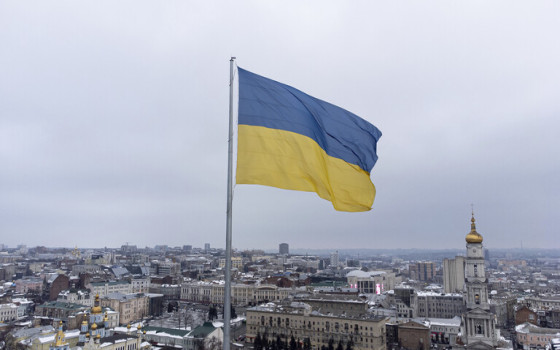
London meeting on support for Ukraine: Increasing economic pressure on Russia until a just peace is achieved, and additional measures to counter the threat posed by stealth fleet vessels to the marine environment and national security.

- Europe and Arabs
- Saturday , 25 October 2025 10:27 AM GMT
Brussels - London: Europe and the Arabs - Agencies
A European statement distributed to journalists in Brussels said that British Prime Minister Starmer co-chaired a virtual meeting of the Coalition of the Willing with French President Macron, attended by Ukrainian President Zelenskyy.
The leaders unanimously affirmed their support for Ukraine, particularly during the harsh winter, and their desire for a just and lasting peace and an end to the bloodshed. They welcomed President Zelenskyy's support for a complete and unconditional ceasefire. They noted that President Putin, by contrast, has rejected a ceasefire, and that Russia has escalated its attacks on Ukrainian civilians and infrastructure, and recklessly violated NATO airspace.
They fully endorsed President Trump's statements that the current contact line must be the starting point for any talks. They reaffirmed their full support for Ukraine's sovereignty and territorial integrity, and the principle of non-change of borders by force.
The leaders emphasized the importance of increasing economic pressure on Russia now and until a just and lasting peace is achieved in Ukraine. They decided to take additional steps to remove Russian oil and gas from the global market, halt any remaining imports into their territories, and deter other countries from trading in Russian oil and gas and supporting the Russian war effort. They welcomed the recent action taken by the United States to this end.
In addition, the leaders agreed to take additional measures to address the threat posed by stealth fleet vessels to the marine environment and national security. These measures include imposing additional sanctions, taking steps to discourage other countries from engaging with the stealth fleet, increasing information sharing, and being prepared to use regulatory and interdiction powers. They agreed to move forward in closer coordination to enhance collective impact.
They also expressed their intention to address Ukraine's urgent financial needs for 2026-2027, including developing options for using the full value of frozen Russian sovereign assets, so that Ukraine can obtain the resources it needs to defend its territory and rebuild its armed forces. They were clear that this should be in addition to existing bilateral military aid flows, which will not be reduced.
They strongly condemned Russia's ongoing campaign to destroy Ukraine's energy and gas infrastructure, an attempt clearly aimed at causing a humanitarian catastrophe and breaking the resilience of the Ukrainian people. They agreed to ensure Ukraine's energy resilience, provide urgent assistance to protect and rebuild its energy infrastructure, and continue to provide additional military support, including air defense.
Finally, they reaffirmed their determination to establish robust arrangements for Ukraine's future security, enabling it to deter and defend against any future attack. They emphasized that plans are in place to deploy a multinational force to Ukraine once hostilities cease, with the aim of helping secure Ukraine's airspace and seas and replenish its armed forces.
The meeting, held in London on Friday, brought together leaders of some 20 European countries, including the leaders of Britain, Denmark, the Netherlands, and France, as well as the NATO Secretary General, as part of the so-called "coalition of the willing" supporting Ukraine.
The British government said the talks would focus on how to increase pressure on Russia, strengthen Ukraine's position, and cripple Russia's ability to continue the war.
Starmer emphasized the importance of developing a clear agenda to bring Russian President Vladimir Putin into the negotiations, and the need to take decisions to limit the financing of the Russian war machine.
He pointed to the importance of the agreement to freeze Russian assets and the flow of these funds to Ukraine, in addition to continuing efforts to remove Russian oil and gas from global markets.
He said the alliance is determined to stand by Ukraine so that it can enter the negotiations under good conditions and from a position of strength.
Zelenskyy Ready for Negotiations
For his part, Ukrainian President Volodymyr Zelenskyy urged Ukraine to enhance its long-range weapons capabilities to pressure Russia to negotiate the war.
Zelenskyy added at the London meeting that "as soon as the Russian president felt the pressure and the possibility of Tomahawk missiles appearing in Ukraine, he immediately announced his readiness to resume talks."
He said that the alliance is capable of protecting Ukraine's energy sector by supplying us with gas and necessary equipment.
He pointed out that there are a number of Patriot systems ready in Europe, and we can use them immediately to protect lives in Ukraine.
He emphasized the need to ban all Russian energy companies and prevent them from entering the market to further pressure Putin to negotiate seriously, stressing that he is "ready for any negotiations."
In the same context, French President Emmanuel Macron said that we must find a strategy to ensure Ukraine's future security, and that efforts must be made to maintain stability in Ukraine and provide military support to Kyiv to ensure its security.
In contrast, Kremlin spokesman Dmitry Peskov confirmed that Putin pledged a "crushing" response to attempts to strike deep inside Russian territory with long-range weapons.
Peskov explained that the Russian president's statement was in the context of responding to attempts to target Russia, not regarding supplying Kyiv with Tomahawk missiles.












No Comments Found